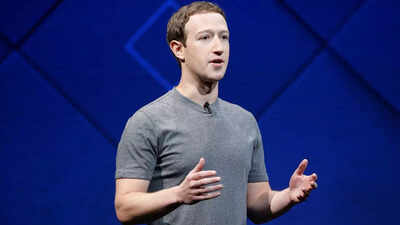Mark Zuckerberg prefers Instagram and X for influencers over his own Facebook, here’s why
April 21, 2025
At a time when Meta’s flagship platforms—Facebook, Instagram, and WhatsApp—continue to serve billions of users worldwide, internal communications reveal deep-seated concerns at the very top of the company about Facebook’s long-term viability. As part of the U.S. Federal Trade Commission’s (FTC) ongoing antitrust lawsuit against Meta, a set of internal emails exchanged between CEOMark Zuckerbergand Facebook head Tom Alison in April 2022 have surfaced. These documents indicate that Zuckerberg is more inclined to follow creators and influencers on platforms likeInstagramand X (formerly Twitter) than on Facebook.
The internal emails highlight a growing disconnect between Facebook’s aging model of “friending” and the contemporary digital culture that increasingly revolves around “following” influencers and public figures. Zuckerberg’s remarks suggest that Facebook’s structure might be fundamentally outdated, potentially limiting its appeal to younger users. The emails also underscore his concerns about cultural relevance, future engagement, and strategic alignment between Meta’s platforms.
In the email conversation, Zuckerberg openly shared that his own habits had shifted over time. He acknowledged that he now prefers following surfers and MMA fighters on Instagram and X instead of Facebook. This personal behavioral change, coming from the CEO of Meta, served as a subtle but telling indicator of broader trends affecting user engagement.
“Every other modern social network is built on following rather than friending,” Zuckerberg noted in the email, suggesting that Facebook’s foundational model may not align with modern user preferences. The statement reflects a candid recognition that users—especially younger ones—are gravitating toward interest-based content and influencers, rather than personal networks of friends and acquaintances.
Cultural relevance and long-term viability of Facebook
Zuckerberg didn’t mince words when evaluating Facebook’s position within contemporary internet culture. He pointed out that while engagement on the Facebook app remained steady in several regions, its cultural relevance was eroding rapidly.
“Even though the FB app’s engagement is steady in many places, it feels like its cultural relevance is decreasing quickly and I worry that this may be a leading indicator of future health issues,” he stated in the email.
This admission highlights a growing concern within Meta’s leadership that Facebook might struggle to remain relevant if it fails to innovate or adapt its user model. It also marks a shift in the internal narrative around the app—from maintaining usage metrics to preserving societal influence and value perception among users.
Facebook’s ‘friending’ model under scrutiny
A key point of discussion in the email exchange revolved around the structural model of Facebook. Unlike platforms such as Instagram, X, or TikTok, which emphasize content discovery through “following” public profiles, Facebook still primarily operates on the concept of mutual friending.
Zuckerberg hinted that this model may be outdated, limiting content exposure and user engagement. “It seems possible that the FB app is just outdated because it never adopted this fundamental innovation,” he wrote, referring to the shift toward a following-based model that dominates most modern platforms.
The implication here is clear: Facebook may need to reimagine or hybridize its user interaction structure if it wants to stay relevant in a rapidly evolving social media environment.
Concerns over community messaging and Facebook groups
While Zuckerberg did express optimism about the growth of community messaging—a rising trend within platforms like WhatsApp and Messenger—he also conveyed skepticism about the future of Facebook Groups. Despite years of investment and strategic focus, he questioned how scalable this format would remain.
“After running at groups in FB for several years, I’m not sure how much further we’ll be able to push this,” he said. “It’s possible groups will just never be as big as friending/following, and that a lot of group behavior is moving to messaging anyway.”
This observation aligns with the broader trend of users shifting toward private, niche, and encrypted spaces such as WhatsApp communities or Telegram channels for discussion and engagement.
Strategic dissonance between Instagram and Facebook
Another important point raised in the email exchange was the internal divergence between Facebook and Instagram in terms of cultural positioning. Zuckerberg acknowledged that Instagram was currently outperforming Facebook in terms of cultural relevance, particularly among younger audiences and trendsetters.
“Differentiating between IG and FB is important, but I think we need to find a strategy that doesn’t leave one service picking up the scraps the other service leaves behind,” he wrote. He emphasized the need for a unified long-term vision rather than siloed growth strategies for Meta’s platforms.
This indicates that while Instagram is thriving with influencer-driven content and high engagement, Facebook’s growth appears increasingly dependent on resolving its identity crisis and adapting to contemporary consumption patterns.
Even with WhatsApp and Instagram, Facebook remains Meta’s backbone
Perhaps the most revealing aspect of the correspondence was Zuckerberg’s candid admission that Meta’s overall success is still heavily reliant on Facebook. Even though Instagram and WhatsApp continue to perform well in terms of engagement and user growth, he noted that Meta cannot afford to have Facebook falter.
“Even if Instagram and WhatsApp do well, I don’t see a path to success for Meta if Facebook falters,” Zuckerberg wrote, signaling that despite Facebook’s age, it remains a cornerstone of Meta’s ecosystem in terms of user base, advertising revenue, and brand identity.
This insight is especially critical as Meta continues to diversify into other areas like metaverse development, AI, and commerce. Facebook’s foundational role means its decline could destabilize Meta’s broader ambitions.
Also read | Airtel recharge plans | Jio recharge plans | BSNL recharge plans
Search
RECENT PRESS RELEASES
Related Post



